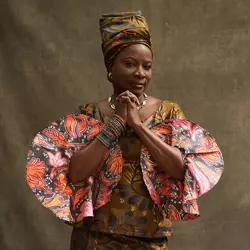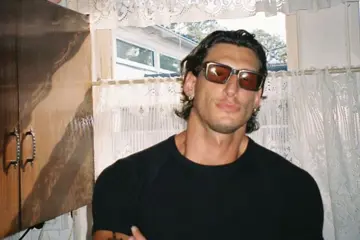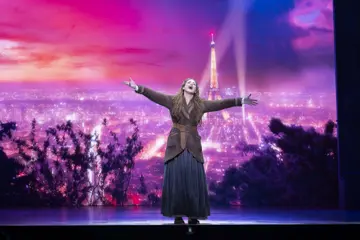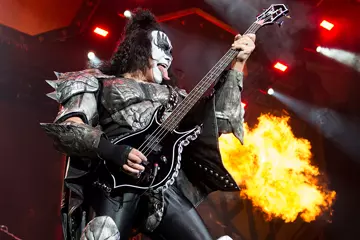 Angelique Kidjo
Angelique KidjoSometimes in an interview the wrong question can be asked and suddenly a previously generous and interesting subject can turn icy and aloof. And usually when an interview subject drops a sentence like, “Oh, don't ask me questions that make me mad,” you know you're going to be in for a tough time, especially if it's only the second sentence they've uttered.
However, African-born singer/songwriter Angelique Kidjo isn't your average interview subject and, though her voice definitely puts her in the diva category, her demeanour certainly doesn't. See, Kidjo hasn't even started answering questions about her long and incredibly illustrious career yet. So far all we've managed to talk about is the northern hemisphere winter she's had to endure since returning from a regular visit to Africa. And the rich and hearty laugh Kidjo gives after adding “Don't go there, girl” suggests this is a woman that likes a chuckle.
Kidjo is on her way to Australia for Bluesfest, but the singer has long been a visitor to our shores. In fact, Kidjo remembers her very first visit here over 20 years ago and the reaction of her parents who were still living in the small West African country of Benin. “My father was still alive and before I leave I call my house and my parents and say I'm going to Australia,” Kidjo explains. “My mother says, 'What? You're going to the end of the world?' but I have to cut the conversation because I was at the airport so my father, when I was gone, showed my mother where Australia was.
“When I came back I call and say I'm back home because my mother was like, 'Come home safe and call us.' I'm like, 'Yeah, yeah, yeah,' because they all were worried for me. I came back and my mum goes, 'What? Where you went to was so far. Jeez, how do you get there? A plane can take you there?' I say, 'Yes mum. I take a plane. I didn't swim.' She goes, 'Man, I knew you were going to be special when you were in my womb. But I didn't know you were going to go that far.'” And there's that laugh again.
Don't miss a beat with our FREE daily newsletter
Kidjo grew up in a musical house. Her mother was a member of a theatre troupe that would travel around the country and her influence was hugely felt by a young Kidjo. “I was fortunate to be born in a very poor family but with a huge respect for education and empowering woman. My father would be mad sometimes and as a child I wouldn't understand. But people would come home and tell him, 'Why are you doing this? Why are you letting your wife do theatre and travel around all over the place with all those people. You should be the one in charge.'
“And my father would always go, 'Love is not a jail. If you love someone set the person free. If my wife is happy then you can't understand how happy I am.' When you have a father that supports that it gives you wings because you know no man in the world can disrespect you. The respect that your father gives you at home has given you that strength.”
Now in her fifties, Kidjo still relies on her family for strength and comfort, but considering how long the singer has been travelling the world as one of the most well respected world musicians out there, she also now has a much larger, extended family. And her dream is always to make that family bigger.
The dream started when Kidjo was a teenager singing in Benin. Initially, she was releasing records and touring only in Africa but then the dream grew. “I thought to myself I'd go everywhere in the world where human beings live. How I am going to get there I didn't know. How long it was going to take me to get to go to those places I didn't know, but I knew that the music I was making was made for people around the world. You have to dream. I think if your dream is not big enough it's not worth it.”
The list of awards Kidjo has won over the years for both her music and her humanitarian efforts is long and covers everything from Grammys to a United Nations Champions Of The Earth award. Last year UK newspaper The Guardian even named her one of their Top 100 Most Inspiring Women in the World.
Kidjo says she knows why people think of her in such a way. “They're talking about the work I do and the perception they have about the work I do. For me it's better than if they see me as the most horrible person in the world. But it makes me think it also comes with great responsibility you know. It makes your work even more challenging for yourself because you've got to live up to that. It's just the beginning of the work you're doing.”
Though Kidjo says her work is just beginning, she has already been making a big difference in Benin and the surrounding countries where a charity she founded, the Batonga Foundation, is giving girls in poor or remote communities the chance to get a secondary school education. Kidjo estimates that around 1200 girls in five West African countries are currently helped by the Batonga Foundation and the singer's January visit home was to meet some of “her girls”.
“I have to go [to Africa] even more now because of the girls I'm putting through school, to see how things are going. I don't want them to feel like I'm a kind of a ghost putting them through school. It's good for me to go there and catch up with them and hear their needs; see how I can respond to those needs.
“Those girls are amazing. Talk about big dreams… When they open their mouths my eyes just pop out of my head. I'm like, 'What?' Because these girls want to do all this and I look at myself and I'm like, 'How do I find the money to help you do this?' One of the girls said to me, 'In the future I want to be the next President of Benin.' Just that, huh? And she looked at me, 'Yeah, just that.' There's no better challenge than this.”
I knew that the music I was making was made for people around the world... I think if your dream is not big enough it's not worth it.”















